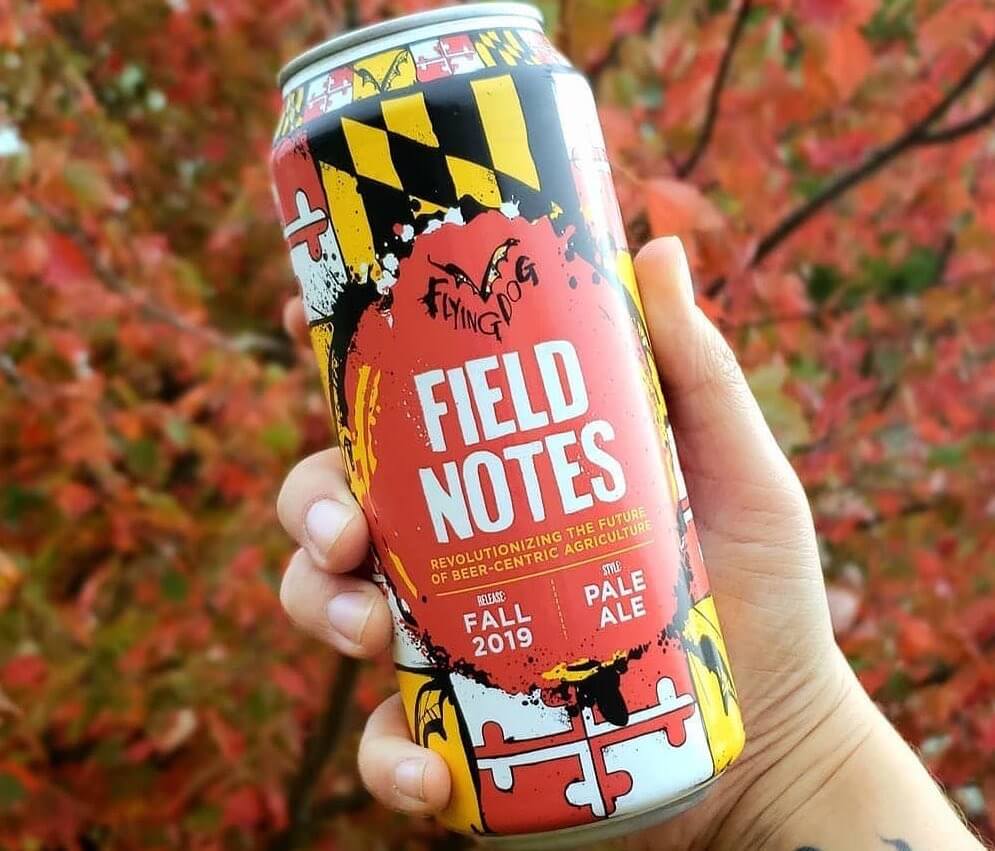- October 30, 2019
- By Chris Carroll
A research relationship between the University of Maryland and the state’s largest craft brewery blossomed this week with a new brew based on Maryland experiments with hops, the flowers that impart the beverage’s complex bitterness.
Sold on tap and in colorful cans that evoke the Maryland flag, the limited-release beer from Frederick-based Flying Dog Brewery is called “Field Notes” in honor of the harvest of data behind it. It’s a pale ale flavored with a variety of hops grown at the Western Maryland Research and Education Center, where University of Maryland Extension (UME) Agent Bryan Butler has completed a fourth season overseeing tests of dozens of strains of the aromatic ingredient to determine what works best in Maryland’s climate.
“It’s not just about this beer, which is the cool, sexy part of the story, but about sharing this information about growing hops—the quality, the quantity, all those kinds of things—with people in the state interested in pursuing it as a business,” Butler said.
Flying Dog is the main funder of the program, and is working closely with UME to evaluate the brewing characteristics of the different varieties, and to create and rate the beers made with each. The goal is to boost the state economy and secure a local supply, Flying Dog Chief Marketing Officer Ben Savage said.
“We are very proud of our partnership with the University of Maryland,” he said in a news release. “Maryland is our home, and we’re excited to be a part of a project that could lead to big breakthroughs in agriculture and brewing science.”
The testing includes plenty of names familiar to IPA fans—Cascade, Centennial, Southern Cross—but also includes some local varieties unknown to the global brewing industry, Butler said. One was offered to Butler for testing by a Smithsburg, Md., farming family that has been growing the hop for a century and making beer with it. Now it’s an ingredient in Field Notes.
“It’s got some really intriguing aspects, and it’s almost like throwback genetics to before Prohibition,” he said. “It would be exciting if it turned out we found a hop that’s been growing here all along, that no one’s been cultivating, and it becomes an ingredient for the brewing industry here.”
Called Lyon for the family that grows it, it produced beer with a hops flavor profile that Flying Dog tasting experts described as “fruity, berry, melony, with hints of apple and pear,” Butler said.
It fared far better in the tests than the well-known Canadian Red Vine variety that, in Maryland’s unpredictable climate, imparted notes of garlic and onion. Major varieties may grow better in other locales, but with varieties like Lyon and others, Maryland could contribute something unique to the world of beer, Butler said.
“We will never be a Washington state, an Oregon or an Idaho,”—states with ideal climates for hops, Butler said. “But we do produce decent quantity, quality, and we have some hops with interesting characteristics.”
